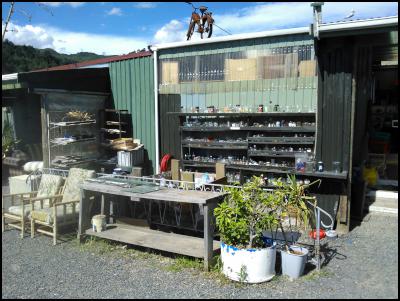Taking the Long View: Sowing Seeds for a Better Future
Submitted to Scoop, 15 May 2017
Taking the Long View
Sowing Seeds for a Better FutureGord Stewart
Starting out we were just a couple of guys with an idea. Four years on, we’re an organisation with a presence. Well, we’d like to think so anyway!
Back in 2013, a young dairy farmer living nearby liked what he’d heard about Transition Towns and reckoned we ought to give it a go in our own community. So the two of hosted an information evening at the memorial hall. To our delight, thirty keen locals came along and our own ‘transition’ effort was born.
As described on the Transition Network website, transition is a movement of communities coming together to reimagine and rebuild our world. A grassroots initiative launched in Totnes, England in 2005, it attracts people who would rather help shape future than worry about it.
Consistent with the movement’s overall philosophy, our local group works to promote energy conservation, sustainable living, and a strong and resilient local economy.
Following that first info session, we formed a small planning group, incorporated as a non-profit society, and got ourselves a logo. With a focus on education, we host tours, run workshops, and hold film nights. We publish a newsletter and write articles for our local newspaper to help spread the word.
Lately we have turned our attention to more tangible projects. One of these aims to increase the number of productive fruit trees on public land and on business and residential properties. At scale, this can help reduce “food miles” and greenhouse gas emissions resulting from the transport of food products and, in turn, help the community become more self-sufficient in food supply.
First step is the involvement of seventeen of our local schools in a broader regional programme providing free, mature fruit trees for planting on school grounds. Complementing this, we’re establishing a fruit tree propagation area at the local high school. When ready for planting, these trees will be available to local businesses and residents.
We’re also encouraging our district council to get serious about waste reduction by emulating the fine efforts of a nearby council. To this end, we are organising a tour of their resource recovery centre for interested councillors and staff.
The Seagull Centre, located at the Thames transfer station, focuses on reducing waste to landfill. Operating as a charitable trust, the Centre was established with $50,000 support from Council. Ten years on it employs a dozen people part time, has an active volunteer group, and annual sales of $240,000 – all from items destined for landfill but instead recovered, repaired as needed and resold.

Thames Seagull Centre – The Seagull Centre at the Thames transfer station reduces waste to landfill by recovering and reselling goods.
The Centre is an inspiration, with its provision of affordable goods, creation of local employment opportunities, and coordination of community projects and events. We’ll look to our council for similar initial support.
We also want them to go for gold in our new $5-million-plus office-library-events centre now under construction. To The Council’s credit, the building has a number of nice eco-design features, but we have been encouraging them to do more around energy efficiency and conservation.
At issue are the possible benefits of an appropriate building management system, double glazing and a Solar PV system – all excluded from current plans as “too costly” (without any analysis done to confirm this). So we asked some probing questions and generally made a bit of a nuisance of ourselves.
Solarcity carried out a preliminary assessment for us with data provided by Council and the case for solar is encouraging. We’re pleased that Council will now have an energy efficiency specialist look into these matters to assess their merit.
It’s all slow going but important stuff. In our own small way, we’re trying to answer some of the big questions posed in David Orr’s thoughtful new book Dangerous Years.
Questions like: What would a sustainable, fair, and resilient economy look like? What energy sources can dependably and benignly power it? And: How large an economy can be sustained within the Earth’s limitations?
Gord Stewart is an environmental sustainability consultant. He does project work for government, industry, and non-profit organisations.
More info
Transition Towns
– www.transitionnetwork.org
Pam
Warhurst’s great TED Talk “How we can eat our
landscapes” – search at www.TED.com
Dangerous Years:
Climate Change, the Long Emergency, and the Way Forward,
by David W Orr, Yale University Press, 2016
The Oberlin
Project, an inspiring community initiative for a sustainable
future – www.oberlinproject.org


 Gordon Campbell: Gordon Campbell On Trump’s Tariff Wars
Gordon Campbell: Gordon Campbell On Trump’s Tariff Wars Richard S. Ehrlich: Israel, Hostages, Thailand & Jobs
Richard S. Ehrlich: Israel, Hostages, Thailand & Jobs Binoy Kampmark: Trump, Tariffs And Russia - A Very Muddled Policy
Binoy Kampmark: Trump, Tariffs And Russia - A Very Muddled Policy Gordon Campbell: DeepSeek, And China’s Inexorable Rise
Gordon Campbell: DeepSeek, And China’s Inexorable Rise Martin LeFevre - Meditations: History Is Not A Game
Martin LeFevre - Meditations: History Is Not A Game Peter Dunne: Dunne's Weekly - ACT Looks Backwards
Peter Dunne: Dunne's Weekly - ACT Looks Backwards